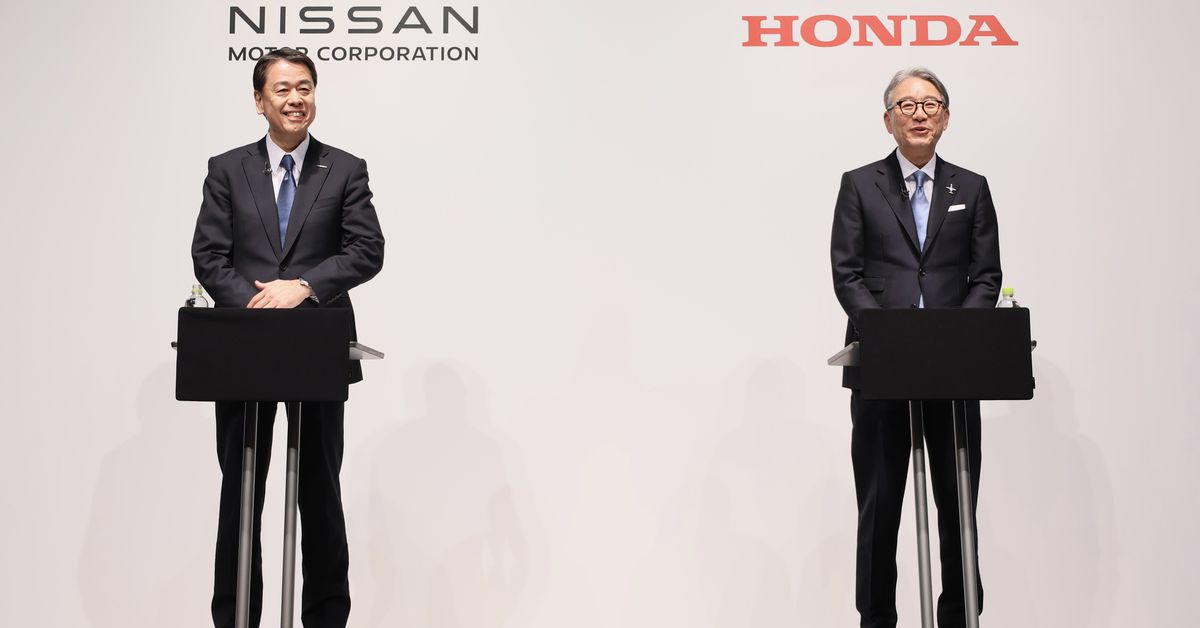Honda and Nissan explore merger to navigate uncertain EV future

Here’s your rewritten article with the same content but expanded to meet the word count requirement while maintaining SEO-friendly formatting:
# The Potential Merger Between Honda And Nissan: A Strategy To Outcompete Electric Vehicle Leaders
Honda And Nissan Have Been In talks For Months About A Potential Merger, A Move That Could Help Them Compete With Established Electric Vehicle Manufacturers Like Tesla And BYD. Reports Suggest The Two Car Giants Have Discussed Creating A New Holding Company Through Which Both Would Operate, A Deal Backed By Anonymous Sources. This Arrangement Would See Both Companies Pool Their Resources To Boost Market Share In An Evolving Automotive Landscape.
### Strategic Collaboration Beyond EV Technology
Both Honda And Nissan Are Not Only Exploring A Merger But Also Considering Expanding Their EV Presence By Bringing In Additional Brands Into The Joint Venture. For Instance, They're Looking At Mitsubishi, Similar To How Japanese Electronics Firms Like Konica Minolta And JVCKenwood Have Historically Worked Together. This Would Mirror A Pattern Seen In The Automotive Sector, Where Companies Often Merge To Strengthen Their Positions.
### Financial Challenges And Market Prospects
Nissan's Recent Financial Struggles Are A Closer Look At The Landscape. According To Reuters, The Company's Net Earnings For The Mid-Year Of 2024 Were Downwardly Adjusted By Over 90%, Resulting In A Need To Cut Its Annual Operating Profit Forecast By Nearly 70%. This Financial Malaise Has Forced Nissan To Reassess Its Strategies, Including Potential Partnerships Like The One With Honda.
### Market Share Dynamics And EV Growth
The Global EV Market Is Experiencing Slow Growth, Particularly In Europe And The Americas, But It's Raging Growth In China. Bloomberg Highlights How Japanese Automakers Are Losing Significant Market Share In East And Southeast Asia To Competitors In Indonesia. This Trend Further Positions A Potential Merger Between Honda And Nissan As A Means Of Reinforcing Market Presence In Key Regions.
### Product Developments And Market Positioning
Honda Is Set To Launch Its New "ZeroEV" Platform Next Year, With Success Already Seen In The United States Via Its GM-Based Electric Prologue SUV. Meanwhile, Nissan, Despite Its Early Lead With Models Like The 2011 Leaf, Has Struggled To Maintain That Position With Subsequent EVs, Including The Ariya.
### Hybrid Models And Market Expansion
Both Companies Are Also Focusing On Hybrid Models As A Strategy To Attract A Broader Customer Base. While They're Increasingly Reliant On Electric Vehicles, Their Product Offerings Include More Hybrid Options Than Full-Electric Models. For Instance, Nissan Aimed To Have 16 "Electrified" Models By 2026, While Honda Plans A Plogue Sports Coupe That Combines Efficiency And Performance.
### Industry Trends And Competitive Landscape
The Shift Towards Electric Vehicles Is Accelerating Across The Automotive Sector, With China Leading The Charge In EV Market Penetration. However, This Growth Isn't Uniformly Translating Into Increased Profits For All Competitors. In fact, Many Established Brands Are Failing To Keep Up With The Rivals' Speed Of Innovation And Market Expansion.
### Financial Struggles And Potential Outcomes
Nissan's Current Financial State Highlights The Risks Associated With A Merger. Without Strategic Partnerships Like The One With Honda, It Could Face Further Challenges. However, Such A Deal Might Provide The Necessary Capital And Expertise To Turn Around The Company's Operations And Secure Its Position In The Market.
### Market Share Dynamics
The Shift In Market Share Is Another Key Factor Influencing These Discussions. As The EV Segment Becomes More Competitive, Companies Are Actively Pursuing Strategies That Can Give Them A Competitive Edge. A Merger Could Help Both Honda And Nissan Leverage Their Combined Resources To Strengthen Their Market Position.
### Potential Synergies And Benefits
The Potential Merger Between Honda And Nissan Could Bring Significant Synergies To The Table. By Combining Resources, They Could Accelerate Innovation In EV Technology And Software Development. Additionally, Bringing Mitsubishi Into The Mix Might Introduce New Strategies And Partnerships That Could Enhance Product Development And Market Reach.
### Challenges And Risks
However, There Are Also Potential Challenges And Risks Associated With Such A Merge. For Instance, Integration Of Operations Could Be Complex And Time-Consuming. Moreover, Competitors In The EV Segment Could Use This Merging Trend To Their Advantage, Creating Opportunities For Disruption And Market Shifts.
### Conclusion
The Discussion Between Honda And Nissan About A Merger Reflects A Broader Trend In The Automotive Industry: Companies Are Actively Seeking Ways To Strengthen Their Positions In Evolving Markets. While The Potential Synergies And Strategic Benefits Of Such A Deal Are Significant, The Challenges And Risks Must Also Be Carefully Considered. As EV Adoption Continues To Accelerate, The Role Of Mergers And Acquisitions Could Become Even More Prominent.





